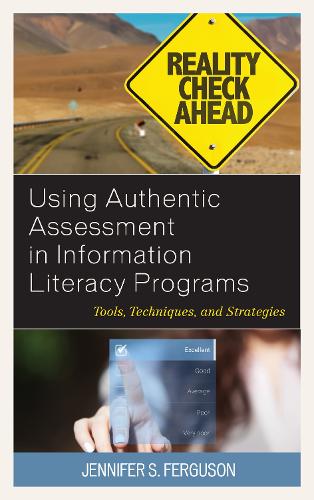
Using Authentic Assessment in Information Literacy Programs: Tools, Techniques, and Strategies
(Paperback)
Available Formats
Publishing Details
Using Authentic Assessment in Information Literacy Programs: Tools, Techniques, and Strategies
By (Author) Jennifer S. Ferguson
Bloomsbury Publishing PLC
Rowman & Littlefield Publishers
15th October 2018
United States
Classifications
Professional and Scholarly
Non Fiction
028.7071
Physical Properties
Paperback
170
Width 150mm, Height 233mm, Spine 13mm
268g
Description
Assessment of student learning continues to be an urgent topic in higher education. For librarians who provide information literacy instruction, creating and implementing authentic assessment instruments asking students to analyze, synthesize and apply what they learn is especially challenging, since most librarians have little more than an hour in which to teach students and assess their learning.
Using Authentic Assessment in Information Literacy Programs: Tools, Techniques, and Strategies offers teaching librarians practical resources and approaches that will help them to implement authentic assessment in any instructional setting. Sections include:
What is authentic assessmentAuthentic assessment tools and techniques across teaching modesHow to adapt authentic assessment to individual library needsUsing authentic assessment to inform teaching strategies and instructional design
Whether you provide one-shot instruction sessions or for-credit courses, in person or online, this book will help you to develop and implement authentic assessment of student learning.
Reviews
Ferguson (Tisch Library, Tufts Univ.) provides a detailed overview of authentic assessment methods in a variety of academic library instructional settings. She asserts in the preface that this book is intended to demystify authentic assessment by defining the terminology, describing how it is used in practice, and providing a practical roadmap for implementation(p. xii) The book opens with a literature review of definitions of authentic assessment over the last 25 years and ends with Ferguson asserting it is essentially techniques that more authentically demonstrate (the libraries) impact on student learning. The author goes on to explore the advantages and challenges of doing authentic assessment in common instructional settings including credit-bearing courses, one-shot sessions, embedded librarianship, and online instruction. She also details over a dozen methods of authentic assessment including minute papers, problem-based activities, reflections, portfolios, and annotated bibliographies. The sixth and final chapter contains eleven sample assignments, prompts, and worksheets that serve as models for implementation. Although many articles have been written about authentic assessment techniques and approaches in library instruction settings, Ferguson's book is unique in that it treats the topic comprehensively.
Summing Up: Recommended. Professionals and practitioners.
Fergusons introduction to authentic assessment, examples of its use in academic departments since the 1980s and in academic libraries, as well as her discussion of advantages and challenges of the practice offer an informative introduction to those unfamiliar with its concepts. . . . This work is highly recommended for addition to all library collections. While it is valuable as a whole, reading and reflecting on the philosophy behind authentic assessment can help librarians, staff, and library administrators evolve their thinking, even if putting the framework into practice is untenable due to lack of time and lack of personnel. * Public Services Quarterly *
Chapter 6, Adapting Authentic Assessment to Common Instructional Session, with its step-by-step instructions, sample worksheets, and accompanying narrative, might be the most popular chapter in the book. The templates that Ferguson provides her readers are the type of practical, quick-start help that any instructional librarian will value. . . . Most of the text, by design, focuses on the intersection of instructional settings and assessment methods, but the book is at its very best when pushing the reader to see instruction and assessment in a fundamentally revised way. * College & Research Libraries *
This book combines clear and detailed explanations with practical advice that librarians can act on to start integrating assessment into their instruction right away. -- Laura Saunders, associate professor, Simmons College
At long last, a book has come along for teaching librarians who want to learn the ropes of authentic assessment. Fergusons sharp sense of strategy and professional practice make this primer on the 'hows' and 'whys' of evaluating information literacy programs an essential reference to keep on the shelf. -- Alison J. Head, Director, Project Information Literacy
Author Bio
Jennifer S. Ferguson is the Team Lead, Arts and Humanities, at the Tisch Library of Tufts University, providing innovative and proactive library service in the areas of research, teaching, and learning to undergraduates, graduate students, and faculty. Jennifer has published on topics that include education for librarianship, discovery layer usability, and streaming video in academic libraries, and won the Association of College & Research Libraries-New England Chapter 2017 Best Paper Award. She has also been invited to speak at regional, national, and international conferences on a wide array of topics, including information literacy and authentic assessment. She has a BA from UCLA, an MA from Rutgers University, and an MSLIS from Simmons College and has worked in both special and academic libraries.
